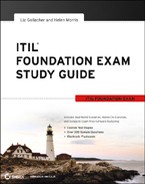Competence and Training
Effective service management requires staff members who understand their job role, not only the tasks they need to perform but the importance of these tasks and their relationship to other processes. Developing staff competencies and skills is an important element in managing services successfully.
The best known and most popular service management training scheme is the ITIL Qualifications scheme. This scheme provides a modular approach to the ITIL framework. It comprises a series of qualifications focused on different aspects of ITIL best practices to various degrees of depth and detail. Each ITIL qualification has a specific credit value; these credits can be used by candidates who are interested in achieving the ITIL expert level. The expert level requires candidates to meet a specific set of key requirements, covering the full spectrum of ITIL best practices.

Competence and Skills for Service Management
As discussed previously, the “people” aspect within the four p’s of effective service management is crucial; good processes depend upon them. Service management products deliver little value if not operated by skilled staff. Third-party suppliers require competent staff within the service provider organization if they are to be effective.
Having the right number of people is not enough; they need to have undergone the training to enable them to be good at their jobs. (Remember that people are both a resource and a capability; education and training develops their capability.) Good staff training will ensure that individuals understand their roles. Training is not a one-off activity; as changes to processes, technology, and services occur, further training will be required. As we have discussed, staff will be involved across different lifecycle stages; someone based in an operational role may have involvement in design, transition, and CSI. Each role they carry out will require specific skills, attributes, and competences. All roles require the following:
- Everyone needs a reasonable awareness of the business in order to understand how IT in general, and the process in particular, helps the business achieve its objectives
- They need customer service skills. These are often thought to be necessary only for service desk staff; although they are essential for that role, they are also required by any role where the IT staff member may come into contact with the business. Desktop engineers, for example, interact with customers on a daily basis, and those involved in coordinating user acceptance testing or service reviews also have regular user contact, so customer service skills are a requirement for all.
- All staff members require the knowledge to carry out their roles; they also need to understand the policies and procedures involved.
Additional attributes may also be required, dependent on the role. These include management skills and the ability to run meetings, such as chairing, taking minutes, and so on. Being able to communicate effectively, in speech and in writing, is essential, and the ability to negotiate and persuade will help ensure others conform to what is required of them. Finally, all roles involve some interpretation of metrics, so analytical skills are also necessary.
Staff may also participate in CSI initiatives. The CSI core guidance describes the specific skills required for them.
Competence and Skills Framework
It can be helpful for service providers to adopt a standard framework for describing job titles, roles and responsibilities, and so on. The Skills Framework for the Information Age (SFIA) is an example of such a reference model. It defines the necessary skills for effective IT services, information systems, and technology. SFIA defines seven generic levels for tasks, with the associated professional skills required. It also defines core competencies. SFIA is used by many IT service providers. You can find more information on SFIA at www.sfia.org.uk.
Specific Training in the ITIL Framework
In addition to the core guidance provided in the ITIL volumes covering service strategy, service design, service transition, service operation and continual service improvement, and the complementary guidance, training is available to enable staff to understand this best practice service management framework and to develop the necessary skills and competencies to carry out its guidance.
The scheme, shown in Figure 7.1, is managed and controlled through the official accreditor, accredited examination institutes, and accredited training organizations to ensure that organizations can be confident in its quality. All training material used and individual trainers also have to meet quality standards. Students take examinations at the end of each course to achieve the relevant certificate, and the qualifications gained are evidence that the student has acquired the associated knowledge of ITIL best practices. The qualifications are recognized worldwide.
FIGURE 7.1 The ITIL qualification scheme
Based on Cabinet Office ITIL® material. Reproduced under license from the Cabinet Office.

The scheme has four levels:
You can find more information on ITIL qualifications at www.itil-officialsite.com.
